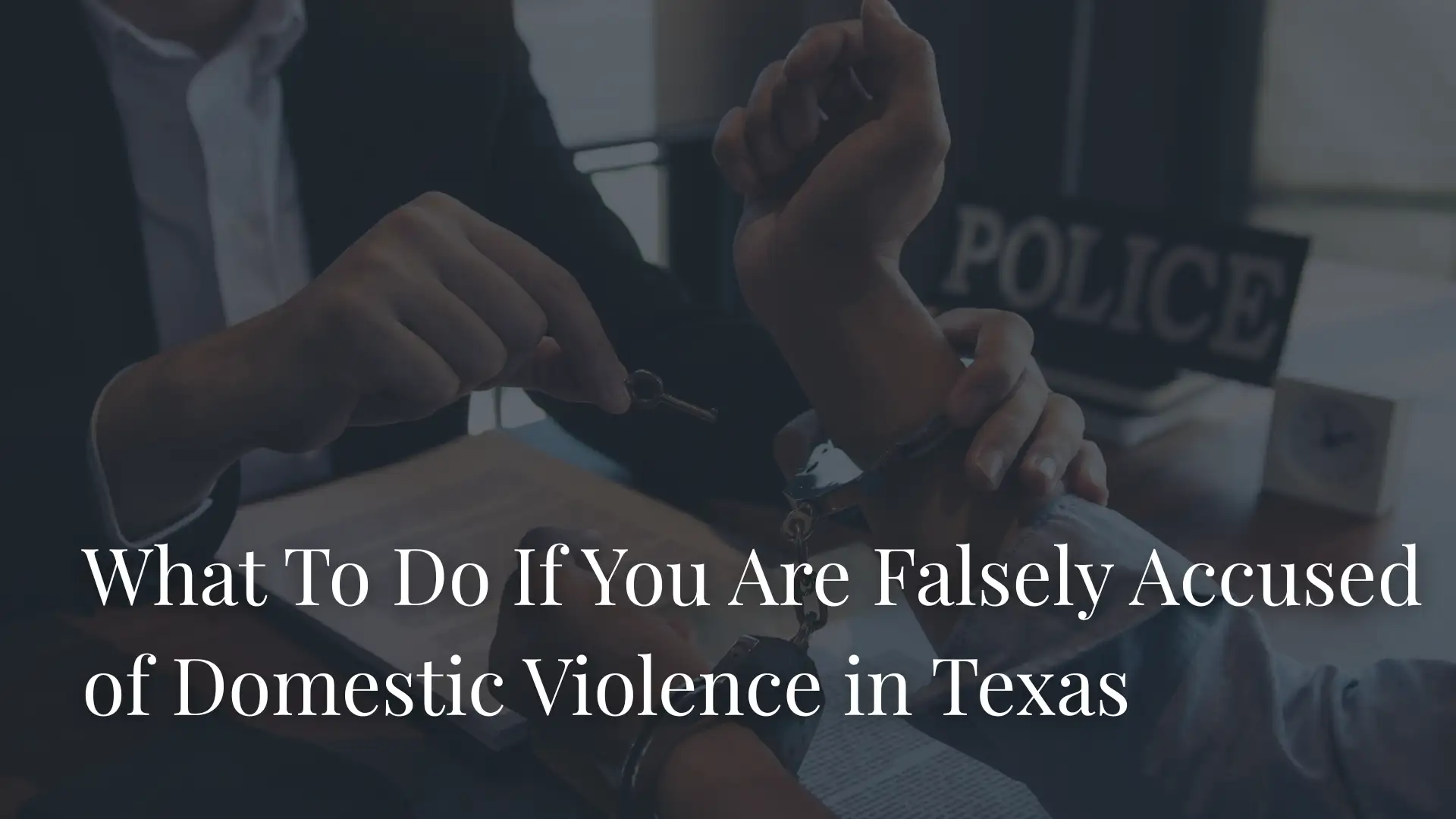
A false accusation of domestic violence can have catastrophic consequences across all areas of your life. These accusations can ruin your reputation, cost you custody of your children, and even send you to jail. It’s understandable to feel angry in this situation, but you must stay calm and take proper action to defend yourself. We’re here to explain how to respond to false accusations of domestic violence in Texas, because being wrongly accused can turn your life upside down and requires a careful, informed response.
Legal Consequences of a Domestic Violence Accusation
Under Texas law, the legal terms for domestic violence are “dating violence” or “family violence.” Dating violence encompasses violent acts or threats against a current dating partner or someone with whom the actor had a previous dating relationship. Family violence refers to violent acts or threats against a member of the defendant’s “household.” A household includes relatives by blood or marriage, adopted or stepchildren, roommates, etc.
State law makes committing dating or family violence in violation of a protective order a Class A misdemeanor for a first offense. The penalties for Class A misdemeanors include up to one year in jail and a fine of up to $4,000.
If the complainant does not have a protective order in place, domestic violence usually falls under the assault statutes in Chapter 22 of the Texas Penal Code. An assault against a family member or dating partner is usually a Class C or Class A misdemeanor, depending on whether the alleged contact is offensive or causes bodily injury. However, third-degree felony charges apply in circumstances such as when the assault includes an allegation of impeding breath or when there have been multiple assault allegations within a 12-month period. Third-degree felonies include a punishment range of two – 10 years in prison, a fine up to $10,000, or anywhere from two – 10 years of probation.
Accusations of domestic violence can also have other consequences, even without a criminal conviction. For instance, a domestic violence accusation can affect divorce or child custody proceedings, potentially including the loss of custody rights. The complainant might also get a protective order against their alleged defendant, which can limit where the order’s subject can go, whom they can talk to, and so on. For someone falsely accused, overcoming a false claim of false allegation of domestic abuse often means facing these restrictions while working to clear their name and protect their future.
What To Do Immediately After Being Accused
Getting angry or acting rashly after understanding a false domestic violence accusation will only make your situation worse. No matter your feelings, stay calm and follow these steps to protect your legal rights and reputation:
- Stay calm and avoid contact with your accuser. Emotional reactions or arguments can worsen your situation, and the police might use them against you.
- Do not speak to the police without a lawyer. You don’t want to say anything the police might misinterpret, so wait for legal guidance before answering questions.
- Hire a criminal defense attorney immediately. A lawyer can protect your rights, gather evidence, and guide you through the legal process. Your attorney can also outline your options for legal action against your accuser.
- Save all communication with the accuser. Texts, emails, or social media messages can show inconsistencies in their account or help prove your side of the story.
- Collect witness information quickly. Anyone who saw the event or can speak to your character can support your defense later in court. However, let your lawyer talk to the witnesses so you don’t face accusations of tampering.
- Document your version of events right away. Writing down details of the encounter while they’re fresh helps preserve your memory for your attorney and a possible trial.
- Preserve physical evidence. Photos, clothing, or items from the scene can counter false claims or demonstrate what happened.
- Follow any protective orders strictly. Violating an order, even accidentally, can lead to new charges and damage your defense. Let your lawyer fight to have the order removed.
- Avoid discussing the case publicly. Prosecutors can use your social media posts or casual conversations to build their case against you.
- Stay in close contact with your lawyer. Regular updates help them prepare the best defense and respond quickly to new developments.
Protective Orders and How to Respond
In domestic violence cases, a protective order is a court order meant to protect the accuser from harm or contact from their abuser. These orders can require you to stay away from the accuser’s home, work, or school, and they may prevent you from contacting them in any way. Sometimes, a protective order can force you to leave your home and restrict access to your children. Violating any term of the order, even by mistake, can lead to an immediate arrest and additional charges.
If your accuser seeks or obtains a protective order against you, taking it seriously from the start is critical. Do not attempt to contact the accuser to “work things out” or explain your side. The authorities might view your actions as harassment and hurt your case. Instead, review the terms of the order carefully with your attorney. They can explain the order and develop a plan to follow its restrictions while building your defense.
You will likely have a hearing to contest the order. Attend the hearing with your attorney, and bring evidence or witnesses supporting your side. Following the order’s terms shows the court you are willing to comply with legal instructions. At the same time, your lawyer can challenge the accusations and present evidence to have the order lifted or limited.
Can You Sue for False Allegations?
 You could have the right to sue someone for defamation if they falsely accuse you of domestic violence. Defamation includes slander (false words) and libel (false written statements). To win, you must prove the accusations were false, made intentionally or with reckless disregard for the truth, and harmed you somehow. Evidence such as witness statements, messages, or official reports can help build your case.
You could have the right to sue someone for defamation if they falsely accuse you of domestic violence. Defamation includes slander (false words) and libel (false written statements). To win, you must prove the accusations were false, made intentionally or with reckless disregard for the truth, and harmed you somehow. Evidence such as witness statements, messages, or official reports can help build your case.
In Texas, you generally have one year from the false statement to file a defamation lawsuit. If you win your case, you can recover compensation for lost income, emotional distress, and harm to your reputation. Punitive damages—additional money not based on a specific loss you suffered—may also apply in cases involving extreme misconduct.
Contact Our Dallas Domestic Violence Defense Attorneys
At My Dallas Criminal Lawyer, we understand the toll of false domestic violence allegations in Dallas and Frisco and can protect your rights and reputation. As we build your defense against the criminal charges, we can explore whether you have a civil case against your accuser. We’ll explore every angle to guide and help you through this legal storm. Call 214-949-4117 or complete our contact form for a free consultation.





